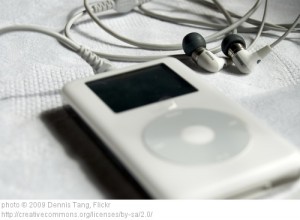This is a slightly edited version of a post originally published in July 2011 on my former blog. I thought it worth a revisit given that Mumford and Sons’s popularity has exploded since I wrote this post (such a cultural bellwether I am), and that some readers are taken aback when I occasionally use profanity in a post.
In the winter of 2010-2011, when I was being treated for breast cancer, I created a new iPod playlist titled simply “Cancer.” Cancer, as crises of various magnitudes tend to do, made me impatient with anything that felt like a waste of time, including listening to music that didn’t tap into something I was feeling, or wanted to feel, or didn’t want to feel but was unsure how not to feel.
My cancer was completely treatable. Knowing how hard even that sort of cancer was, I have a new appreciation for people whose cancer is terminal, requires chemo, or causes great pain. Mine was none of that. It was hard. But it could have been much, much harder.
That said, it was a bad winter. Two surgeries, one each in November and December. Seven weeks of daily radiation—the same weeks when there were not merely inches, but feet of snow on the ground. I understood for the first time what depression really feels like, because I felt it. I stopped enjoying things that usually provide reliable oases of pleasure during the mundane, repetitive routines of family life—coffee, food, books. Was my mood due to my cancer treatment, the gray and cold winter, being cooped up daily with a five-year-old who was completely ready for kindergarten a full year before he was eligible? All of the above.
 Music, however, never completely lost its heartening power. So I made a playlist of exactly the songs I wanted to listen to. And I listened to them. A lot. In the kitchen when I was fixing lunches or cleaning up supper. When I’d force myself to take a walk on a relatively balmy 35-degree day. When I was cleaning a bathroom.
Music, however, never completely lost its heartening power. So I made a playlist of exactly the songs I wanted to listen to. And I listened to them. A lot. In the kitchen when I was fixing lunches or cleaning up supper. When I’d force myself to take a walk on a relatively balmy 35-degree day. When I was cleaning a bathroom.
My cancer treatment ended in late February, and eventually, even that record-breaking winter ended. I undertook a reinvention of sorts. Cut and dyed my hair. Started exercising and joined Weight Watchers. And I put away my cancer playlist. Recently, I took a look at the playlist again. The thing about suffering is that we usually can’t make it go away. We just have to get through it. What helps us to do that, to keep putting one foot in front of the other, to feel not so alone, to nourish that bright spot of hope that assures us it won’t always be this hard? My song choices, I think, say a lot about both what it feels like to dwell in the shadows of a painful period, and what helps us the most during those times.
We need to feel what we are feeling. I did some wallowing that winter, and chose songs that helped me wallow by putting words to my more unruly emotions. Mumford and Sons’White Blank Pageincludes a line about “swelling rage,” in which the music actually swells and the lead singer’s voice takes on a menacing rasp. The line is not just about rage; it embodies rage. Whenever I heard that song, I became more aware of how angry I was that my winter was being stolen out from under me.
I hope my friends and family would attest that I did not go through this winter in a constant state of swelling rage. We need to feel what we are feeling—rage, grief, frustration, hopelessness—but we also need to live our lives without poisoning the very air we breathe. The angry and sad music I chose (Barber’s Adagio for Strings, Sarah McLachlan’s entire Laws of Illusion album, written in the wake of her divorce) helped me to wallow in sadness and anger now and then, and then set them aside so I could continue to work, prepare meals, and help my kids with their homework.
Profanity has a purpose. I chose several songs simply because of their most excellent use of profanity, such as It’s Been Awhile by Staind, and Little Lion Man, again by Mumford and Sons. In the Christian blogosphere, there is some disagreement over whether profanity has a place. When I wrote for Christianity Today about the adults-only picture book phenomenon, Go the F* to Sleep, many readers agreed that the author’s use of the f-bomb effectively gave voice to parents’ fatigue and frustration when their kids won’t settle down to bed. But a few were shocked that a Christian would even consider having such a book in her possession, and had trouble disentangling the f-word as used in the book from its sexual connotations.
As a writer, I aim to choose the best words to express a particular idea and set a particular tone. Sometimes, the best word happens to be a profanity. There is a world of difference in tone and intent, for example, between “messed it up,” and “f-d it up,” and Mumford and Sons’s Little Lion Man would lose some power and poetry if they used the former instead of the latter. (That said, few things lead me to reject a piece of writing faster than gratuitous, excessive use of profanity, which some writers overuse in an attempt to appear authentic and edgy. Good writing is also marked by restraint.)
In the midst of my frigid and tedious winter, I needed some good profanity to adequately describe how much it all sucked. Sometimes an f-bomb is the exact right word.
Laughter helps. My favorite type of humor tends to be a little bit dark; I prefer biting satire to the latest Internet video of a cat. I also gravitate toward irreverence. Perhaps that’s an inevitable result of going through life as a Good Girl.
My cancer playlist included the Crash Test Dummies’ God Shuffled His Feet, in which God, hosting a picnic on the seventh day of creation, is stumped by his creatures’ questions (“Will we get haircuts in heaven?”). He responds with a story about a boy with blue hair, which leaves the people scratching their heads: “Is that a parable, or a very subtle joke?” I also included Sublime’s What I Got, which besides some good profanity, includes some black humor about just how bad life can get (“Life is too short so love the one you got, ’cause you might get run over or you might get shot”) before asserting that “Love is what I got. Just remember this.”
This sort of humor suited those icy, dark winter days just perfectly.
The best kind of hope is the honest kind. My playlist did not include any bubbly pop songs about how lucky I am to be loved (though I am). But there were plenty of songs about real hope, the kind that acknowledges that life is hard and painful. Really, those kinds of songs made up the bulk of the list: the Indigo Girls’ All That We Let In (“You may not see it when it’s sticking to your skin, but we’re better off for all that we let in”); the Counting Crows’ Long December (“It’s been a long December, and there’s reason to believe that this year will be better than the last”); and Pearl Jam’s The End (“I just want to grow old”).
My favorite song on the whole list is, again, from Mumford and Sons (their debut album was essentially my soundtrack for the winter). From After the Storm: “Night has always pushed up day…There will come a time, you’ll see, with no more tears, when love will not break your heart but dismiss your fears. Get over your hill and see what you find there…”
Christians are often really bad at dealing with suffering, resorting too readily to platitudes rather than just keeping each other company, side by side in the dark. When we are in pain, we need space in which to name our pain (even wallow and curse a bit), the assurance that we are not the first people who have felt this way, a laugh or two, and hard-won hope that acknowledges how very painful life can be.











